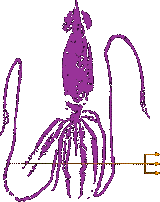


COMODORO RIVADAVIA, Argentina — The Argentine coast
guard ship, crashing through white-capped Atlantic waters
and battling 40 mile-an-hour head winds, finally caught up
to the South Korean fishing boat after a two-hour chase.
When Argentine officials hoisted hook ladders and
boarded the vessel this month, what they found in the
ice-filled hold came as no surprise: a mountain of
freshly caught shortfin squid, one of the most popular seafood
delicacies found on dinner plates throughout Asia.
"It's the fourth boat fishing illegally that we've
chased and captured this year, just in this district,"
said Capt. Pedro Mele, recounting the chase in the
coast guard headquarters overlooking this iron-gray port.
"It had about 20 tons of processed squid on board,
and more that was unprocessed."
The four seizures are a point of national pride,
but officials said many more foreign fishing boats
have evaded capture in search of
Argentine squid — an increasingly sought-after staple of
Asian dishes and Spanish paellas.
Hundreds of Asian boats are spotted each year illegally
dropping their nets and lines in Argentine territorial waters,
which extend 200 nautical miles from the coast.
In the past decade, Argentina's seafood harvest has
exploded. In the early 1990s, the ocean catch was
virtually negligible in terms of revenue.
Since then, it has surpassed Argentina's celebrated beef,
in most years bringing in $800 million to $1 billion.
Last year, Argentina exported 493,000 metric tons of seafood.
Consequently, the country recently has become
especially protective of its maritime resources.
Fines of about $350,000 have been imposed to deter
illegal fishing, and authorities have reported that
some fishing crews have sunk their boats and escaped
to other vessels, presumably to avoid paying the penalties.
Much to the annoyance of fishery officials,
a ragtag flotilla of foreign fishing boats
routinely hovers just outside the 200-mile boundary,
flirting with a line that is very difficult to safeguard.
The boats may fish with impunity outside the
200-mile mark, but the migratory squid,
which range from waters near the Falkland Islands
toward the Uruguayan coast, often tempt them to cross
the invisible line. Conservationists express concern
that the harvesting, even if legal,
may be dangerously depleting the squid population.
"The boats are risking more and more all the time,"
said Eduardo Coutinho, chief of operations for the
coast guard at Comodoro Rivadavia.
Although there are more than 100 known species of
squid, the Argentine shortfin is one of two that
together constitute the majority
of the international calamari market.
The squid live for only about a year and are highly
reproductive. But last year's squid catch was less than
one-fourth of the harvest five years earlier, when the
area was labeled the world's fastest-growing fishery.
"The squid have been overfished, and the entire
population is having trouble,"
said Claudio Campagna, who spearheads the
Wildlife Conservation Society's programs in Argentina.



